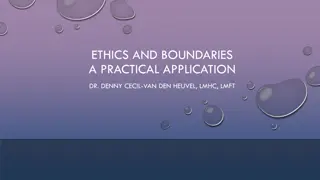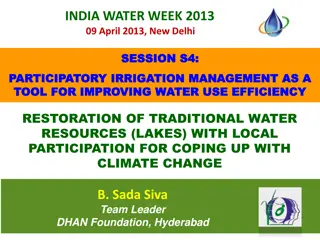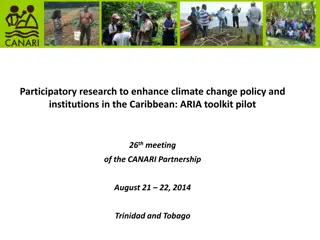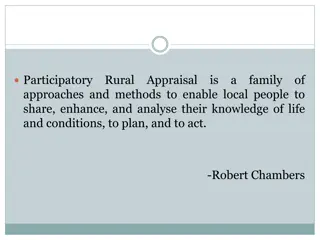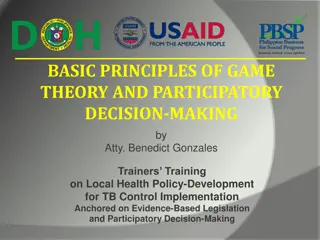Research Ethics in PPIE & Participatory Research: Principles & Pitfalls
Significance of research ethics in PPIE and participatory research, covering principles, historical context, potential pitfalls, and levels of ethics in practice. Gain insights into ethical considerations to ensure responsible and respectful research conduct.
Download Presentation

Please find below an Image/Link to download the presentation.
The content on the website is provided AS IS for your information and personal use only. It may not be sold, licensed, or shared on other websites without obtaining consent from the author.If you encounter any issues during the download, it is possible that the publisher has removed the file from their server.
You are allowed to download the files provided on this website for personal or commercial use, subject to the condition that they are used lawfully. All files are the property of their respective owners.
The content on the website is provided AS IS for your information and personal use only. It may not be sold, licensed, or shared on other websites without obtaining consent from the author.
E N D
Presentation Transcript
Welcome to Research Ethics in PPIE and Participatory Research Presented by Dr Steph Grohmann Senior Program Manager Research Ethics and Inclusion
Outline: What is research ethics and why do we need it? Some principles of research ethics Different understandings of research ethics Does PPIE/participatory research need ethics? Potential ethical pitfalls to consider in PPIE/participatory research Mini ethics checklist for PPIE/participatory research Where can I get support for my PPIE study/formal ethics review? Space for comments and questions
What is research ethics? A)General conduct expected of scientists re plagiarism, data falsification, conflict of interest (a.k.a research integrity ) B)Ethics in research with human participants: how to not harm the people your research is about/for C)The responsibility of science towards society: how to use public funds, make results applicable, avoid social harm Im age credit: Reidun Tangen via Researchgate
Why do we bother? The history of (especially medical) research is a history of human rights abuses and the exploitation of vulnerable groups Examples: Early vaccine studies Nazi experimentation Studies on enslaved people Racist science (e.g. Tuskegee study) Psychiatric interventions (e.g. lobotomies) Psychological experiments (Stanford Prison Study, Milgram Experiment ) The Nuremberg doctor s trial, public domain
General principles Informed Consent Beneficience and non-maleficience Respect for Persons Confidentiality and data protection Conflict of Interest Social Justice
and some not so general ones Reflexivity Epistemic/cultural/moral relativism Cultural and intellectual property Anonymity vs. Recognition Trauma-informed approaches Political economy considerations
One ethics or many? In practice, research ethics can refer to: Institutional ethics procedures (law-oriented, bureaucratic, box-ticking ) Professional ethics systems in different disciplines (reflexive, qualitative, adaptive) General ethics (socio-culturally specific) These levels can and do come into conflict! ? Examples: Rigid bureaucratic procedures vs. the needs of culturally specific human subjects Legal liability vs. moral responsibility Managerial university governance vs. freedom of science And: for-profit science produces inherent institutional conflicts of interest
Involving the public in research is a good thing for democracy! A multilayered phenomenon General ethics How do we make sure our refugee participants understand what it says in our consent form? Professional ethics Admin is making us fill in another %$@&# form!!! Bureaucracy
Is there an Ethics of PPIE? The rationale for PPI includes a moral/ethical dimension, based on the argument that those who have lived experience of the phenomenon being researched (eg., a health condition) should also have a voice in related research (Kaisler et. al. 2021) Currently, there is no requirement for formal ethical scrutiny of processes for engaging and collaborating in this way. This may leave researchers in a position where they unwittingly fail to consider in full the needs, capacity, level of involvement and required resources prior to approaching or working with PPIE members (Troya 2019) How, then, can we liberate from a disproportionate ethics regime this family of approaches to intervention design which have many goals and methods in common? How can we avoid constructing people as vulnerable participants rather than partners, with agency? (Locock and Boaz 2019)
Sodoes PPIE need ethics review? In Austria, only experimental medical studies have a legal requirement for ethics review Medical ethics committees often decline review for non-experimental methodologies as this is not their area of expertise Timeline collisions: involvement often starts at the design stage, but ethics review comes later Guidance from many internationally leading institutions in health research exempts PPIE from ethics review But: There is mounting criticism about PPIE/participatory research being an ethical Wild West Publishers and funders increasingly want to see proof of ethics review for ALL activities involving human participants
Challenges for ethics practice in PPIE research Different understandings of what we mean by ethics lead to conflicts Different institutional and research cultures don t always translate between international contexts Institutional timeframes and remits do not map well onto PPIE contexts Lack of clear guidance: what to look out for in PPIE research? Some ethical pitfalls are specific to PPIE research
Potential pitfalls 1) Participation becoming a fig leaf to avoid bureaucracy 2) Lack of oversight over ethical treatment of co-creators 3) Lack of redress for participants in case of complaints 4) Potentially less care re data protection/anonymity 5) Blindness to socio-cultural power differentials 6) Lack of reflection on potential harms through involvement (e.g. trauma) 7) Lack of reflection on economic aspects of collaboration ( yay, free labor! ) 8) Lack of reflection about participant s own perspective
How not to ethics 1: The Noble Savage 19th century colonial idea that indigenous people are pure, good and child-like , unlike Westerners Jean-Jacques Rousseau: only the uncorrupted savage can be truly virtuous Famous example: Robinson Crusoe and Friday But: Positive stereotypes are still stereotypes Othering and homogenizing ANY community is the first step towards dehumanizing them Illustration for RobinsonCrusoe , public domain
to The Noble Patient? Patients/participants are always pure and good and have only the best interests of science/society in mind. Any patient is as good as any other, so I ll just go with the low hanging fruit to save time . But: Patients/participants do not all think and feel alike. Sometimes they disagree profoundly among each other. Some patient communities are in an ongoing state of conflict (e.g. various disability communities over cure vs. acceptance debates). Patients/participants are individuals, subject to bias, personal preference and prejudice just like us. Respect for persons also means resisting the temptation to other and/or homogenize participants
How not to ethics 2: Open Innovation does not mean pillage and plunder! Goodbye and thanks for all the scientific capital! Thanks to neoliberalism, scientific careers demand the accumulation of social capital in form of publications, citations, and other performance indicators . Our participants are helping us to do this. They contribute: social capital: contacts, community access, credibility knowledge capital: data, skills, experience cultural capital: insights into the life-worlds of research consumers/beneficiaries ethical capital: their participation makes us look better to funders and publishers We owe it to them to consider what constitutes fair compensation for this investment in our work. This can include material rewards as well as public recognition.
How not to ethics 3: How were we supposed to know this would upset them? All participatory research, but especially research involving patients, poses a risk for distressing or traumatic material to surface This is even more likely when working with marginalized or vulnerable groups and their loved ones We cannot know in advance what exactly may cause distress to our participants, but we can think about what is likely to, especially in terms of responses to illness and suffering We should be prepared for the eventuality of a crisis by having a trauma response plan, e.g. including a process to refer participants to psychosocial emergency services Participatory research on illness and other distressing topics needs to be trauma- informed and have a risk-mitigation strategy in place
How not to ethics 4: but we did everything the ethics committee asked for! In the early 1900s, Walter Reed (USA) conducted experiments to determine the cause of yellow fever. He exposed Spanish immigrant workers in Cuba to the disease. Participants were promised $100 (ca. $3500 today), twice that if they developed symptoms. Six participants died, including two researcher-volunteers (Reed himself declined to self-experiment). The participants all signed consent forms, some translated into Spanish. Reed s study today counts as the first use of consent forms in medical history. Image: public domain Bureaucracy does not replace a conscience
Our support services The LBG OIS Center offers advice, support and training on all things research ethics Troubleshooting available any time We re always happy to answer your questions: ethics@lbg.ac.at steph.grohmann@lbg.ac.at
Key takeaways: Research ethics is a multidimensional and contested set of practices PPIE/participatory research is not an ethics-free zone Patients/participants are individual persons, not a homogenous mass Participation is a contribution to our livelihood and should be honored as such Participatory research must be trauma-informed and risk-aware Bureaucracy can help to monitor ethics but it does not replace a moral compass The LBG OIS Center is here to help!


